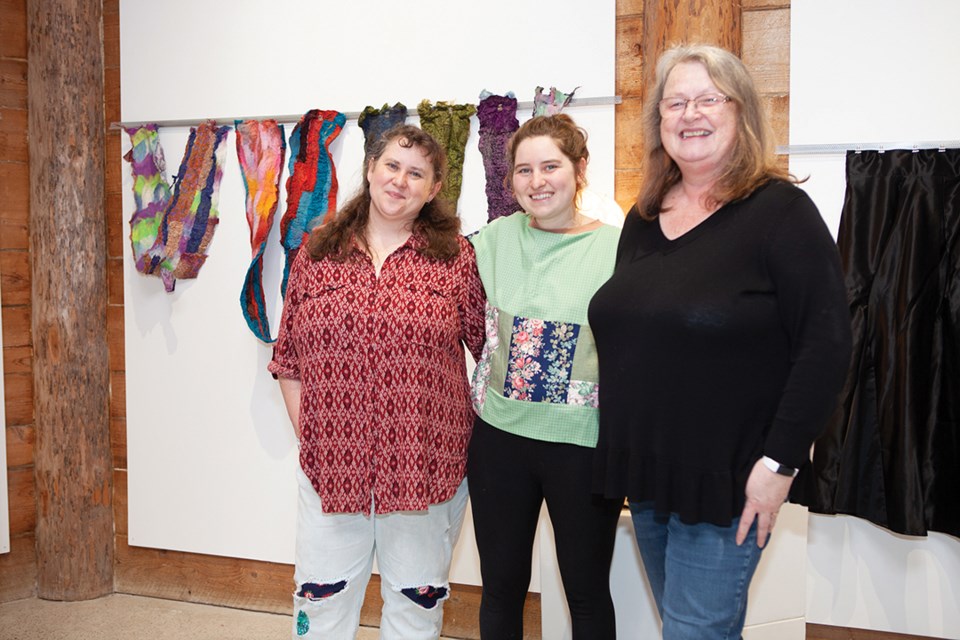Emerging textile artists who refined their craft through mentorships with local fibre practitioners have unveiled designs that serve as stylish rebuttals to the culture of consumable couture.
The Slow Fashion and Climate Action exhibition at the Sunshine Coast Arts Council’s Arts Centre in Sechelt features garments and other fibre works created by the young artists and their mentors. Participants in the three-month mentorship program developed original clothing brands that transformed secondhand apparel and worn-out materials into cutting-edge fashion.
The young artists and mentors collaborated through a series of workshops and presentations. The program was the result of collaboration between the Sunshine Coast Arts Council and the Sunshine Coast Fibreshed Society. Six high school and post-secondary students were accepted to work alongside the seven-member mentorship team.
“When I was a kid, my dream job was always to open my own clothing business,” said Kendra Hood, was was mentored by Maya Bergeron, the founder and designer at uni design—a firm that specializes in genderless clothing made from upcycled materials.
“When there’s a used article of clothing, you don’t need to just throw it away,” said Hood. “You can actually turn it into a masterpiece instead of throwing it in the garbage because it has a rip in it. I might make it into a bag, or I might add some more rips to make it cool, or I might patch it up with different clothing.”
Participants experimented with a variety of repurposed materials during workshops on quilting, pattern drafting, weaving, felting, and garment reconstruction. Jessica Silvey, one of the instructors, is a Coast Salish weaver whose baskets and textiles were featured in a recent show at the Art Centre.
Mentor Danielle Stephens, a member of the Sunshine Coast Quilters’ Guild, said that the program provided insight into the complex origins of consumer clothing. “After people have gone through that mental progression from raw materials to finished product, they look at cloth differently—and their own clothing, knowing what goes into fast fashion and slow fashion.”
Slow fashion is an approach that emphasizes longevity, hand-crafted garments, and a deeper consciousness about the provenance of raw materials.
Many of the works in the exhibit are displayed on dress form mannequins modeled on the designers themselves. Althea Hume’s “garbage jacket” was assembled using paint, locally-sourced patches, and pins; she combined doilies and a curtain into a runway-ready dress. Scarlett Macpherson, inspired from a mossy forested path where she walks her dog, felted a scarf out of fibres and leftover pieces of sari.
“The feeling of making something new and wearable out of something old is probably the best feeling ever,” said Jamie McCartney, who transfigured bedsheets, lace, and T-shirts.
Mentor Trish Clooney is a member of the Sunshine Coast Fibreshed Society. Like the other instructors, Clooney contributed some of her own designs to the exhibition. In the garments on display, she sees the progression of each of the participants. “They are different now, in terms of their skill level, their understanding, their passion for the art,” she said. “It was really fun to see they were working on things at home. You could really see that they were taking what they were learning and actually applying it.”
According to Sadira Rodrigues, the Arts Centre’s Curator/Director, work is already underway to secure funding to repeat the mentorship program next year.
The Slow Fashion and Climate Action show remains at the Arts Centre in Sechelt until May 14, 2022. It features creations by fibre artists Althea Hume, Breanna Picard, Emily Picard, Jamie McCarty, Kendra Hood and Scarlett MacPherson—as well as mentors Ann Harmer, Alexis Bach, Catherine Nicholls, Danielle Stephens, Jessica Silvey, Maya Bergeron and Trish Clooney.
The date of an upcoming fashion show and artists’ reception will be announced at sunshinecoastartscouncil.com.



